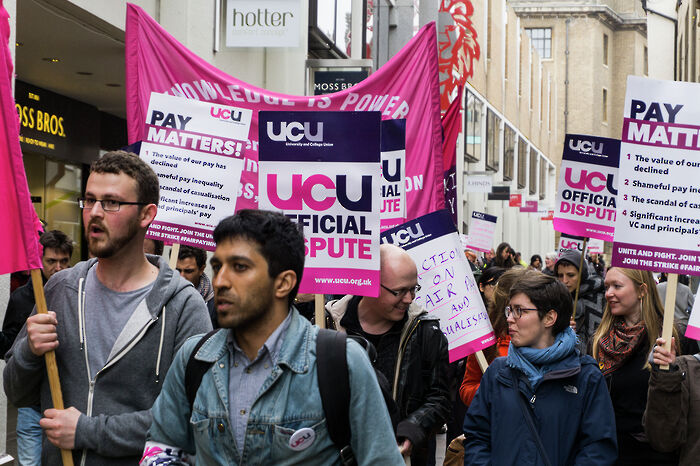Cambridge academics to strike for two weeks if pension agreement is not reached
If an agreement between the UCU and UUK over academics’ pensions is not reached tomorrow, strikes will begin on February 22nd

The UCU has announced plans for 14 days of “escalating strike action” to begin on February 22nd if their negotiations with university advocacy group Universities UK (UUK) fail to reach an agreed-upon solution by their conclusion tomorrow.
If no agreement is reached, strikes will occur in 61 higher education institutions across the UK, including the University of Cambridge. The UCU is planning for the strikes to take place in blocks of up to five days, beginning with a two-day walkout on February 22nd and 23rd, alongside actions deemed ‘short of a strike’, such as lecturers refusing to cover or reschedule classes. The action is planned to escalate to three-day, four-day and five-day walkouts in future weeks.
The UCU announced plans for strike action hours after results of their nationwide ballot, which closed last Friday, indicated overwhelming support for industrial action over pension reforms. Cambridge academics mirrored national support for industrial action with 89.4% of the University’s eligible members of the UCU in support of potential strike action and 95.8% in support of action short of a strike. The turnout of 57.5% in Cambridge surpassed the minimum of 50% turnout legally required for a union to initiate a strike.
88% of UCU members at institutions across the UK – that is, 21,685 members – backed strike action with a 58% turnout.
The call for industrial action is a reaction to a UUK proposal to entirely replace defined benefit pension schemes – which offers a guaranteed retirement income – with defined contribution pension schemes. Under defined contribution schemes, pension incomes depend on returns from stock market investments and are therefore considered riskier and less generous. The Cambridge UCU has stated that they are “optimistic” that a nationwide strike would prevent the implementation of a defined contribution pension scheme.
The fight over changes to academics’ pensions has come to light as criticism over vice-chancellors’ wages exceeding an 'acceptable range' has reached a fever pitch. However, the University of Cambridge is not empowered to make proposals regarding pension reform independently, as Cambridge staff are members of the Universities Superannuation Scheme (USS), a pension scheme whose increasing financial deficit has prompted the pension reforms.
The Cambridge UCU expressed concerns that such changes to pensions could disincentivise those pursuing a career in academia to work at universities under the USS such as Cambridge, where disparities in benefits between different parts of the higher education sector “cannot be sustainable”.
 News / Judge Business School advisor resigns over Epstein and Andrew links18 February 2026
News / Judge Business School advisor resigns over Epstein and Andrew links18 February 2026 News / Gov grants £36m to Cambridge supercomputer17 February 2026
News / Gov grants £36m to Cambridge supercomputer17 February 2026 News / Hundreds of Cambridge academics demand vote on fate of vet course20 February 2026
News / Hundreds of Cambridge academics demand vote on fate of vet course20 February 2026 News / CUCA members attend Reform rally in London20 February 2026
News / CUCA members attend Reform rally in London20 February 2026 News / Union speakers condemn ‘hateful’ Katie Hopkins speech14 February 2026
News / Union speakers condemn ‘hateful’ Katie Hopkins speech14 February 2026











